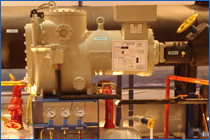What are Industrial chillers?
The essential components of all industrial chillers in India are the evaporator, compressor, expansion device, and condenser. They cool a fluid (usually water or a water/glycol mixture) using a closed loop refrigeration circuit. The refrigerant is circulated through the closed loop by the compressor, from the condenser to the expansion device to the evaporator, and then back to the compressor.
The expansion device, which is commonly a valve or a capillary tube, metres the refrigerant as it passes through the circuit. The heat is extracted by the evaporator, which lowers the fluid temperature while increasing the refrigerant temperature. The recovered heat must be released from the system somewhere else in a closed loop system. The condenser is responsible for this function. The condenser receives refrigerant that has been heated by the evaporator fluid and the compressor. The major difference between water-cooled and air-cooled chillers is how the condenser cools the refrigerant.
What are water cooled chillers?
Water is used to cool the refrigerant in the condenser in water-cooled chillers. Water-cooled chillers are tube-in-tube, tube-in-shell, or plate-type heat-exchangers in which the refrigerant is cooled by water from a cooling tower or other water source. The refrigerant and cooling water do not come into direct contact; instead, they travel through separate channels within the heat exchanger that are close enough to allow for efficient heat transfer. The water flows over the refrigerant tubes, absorbing the heat and decreasing the refrigerant temperature to the required degree for use in the system.
Water Cooled Chiller Specifications
There are a plethora of Water Cooled Chiller suppliers. Choosing the best one amongst them should be based on:
- Cost consideration: Price will be a consideration, as it will be with any equipment purchase. The initial cost difference between an air-cooled and a water-cooled chiller, however, may be deceiving. Instead, to make the most accurate comparison, all lifetime expenditures must be considered.
- High-Temperature Environments: Because water-cooled chillers do not rely on ambient air for cooling, they are ideal for high-temperature environments. As a result, they can be used in hot mechanical rooms or areas with little ventilation.
- Small Spaces: The condenser on a water-cooled chiller is smaller than an air-cooled device of comparable size. In the case of high-capacity chillers, this can result in a smaller overall unit. However, enough room will be required for the full refrigeration system.
How to find good water-cooled chillers supplier:
- A good chiller supplier will have several options to choose from which will be best suited as per your specifications. There will be many Water Cooled Chillers based on: Capacity Range, Refrigerant, Best Full-load Efficiency, Best Part-load Efficiency, Compressor Type, Pressure type, etc.
- The installation guide, maintenance (periodic/real-time) guide would be explained or carried out by the supplier.
- There are a plethora of suppliers- it is best to choose from one which has been in business with bigger, well-known industries.
- Look at the record, past dealings of the supplier to understand the kind of business they do.
Purchasing a water-cooled chiller is a capital-intensive investment. Hence, it is imperative to look at all the aspects of the supplier before purchasing one. Clients will come across different options on the website for purchasing the chillers. They will visit the website and get the details about the same. If clients are having, queries then they can call their customer care executive about their queries. They can also call them at their home to brief them about the best and affordable chillers according to their need and requirements.
